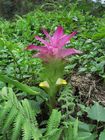Note: This is a project under development. The articles on this wiki are just being initiated and broadly incomplete. You can Help creating new pages.
Difference between revisions of "Holostemma adakodien - Arkapushpi, Holostemma"
m (Prabhakar moved page Holostemma annularis - Arkapushpi, to Holostemma annularis - Arkapushpi, Holostemma) |
(→Habit) |
||
| Line 18: | Line 18: | ||
==Habit== | ==Habit== | ||
| − | {{Habit| | + | {{Habit|Climber}} |
==Identification== | ==Identification== | ||
Revision as of 12:09, 7 April 2018
Arkapushpi is a genus of Flowering plants formerly belonging to the plant family Asclepiadaceae, now considered to be part of the Apocynaceae. The genus was first described in 1810. As presently constituted, the genus contains only one known species, Holostemma ada-kodien, native to southern Asia (China, Nepal, Pakistan, Kashmir, India, Sri Lanka, Myanmar, Thailand).
Contents
Uses
arthritis, heartburn, joint pain, stomach pain, ulcerative colitis, bypass surgery, diarrhea, intestinal gas, loss of appetite, jaundice, liver problems, Helicobacter pylori, stomach ulcers, irritable bowel syndrome, gallbladder disorders, high cholesterol, lichen planus, fatigue, headaches[1]
Parts Used
Chemical Composition
Rhizome yields essential oil, containing curdione and curcumol, colouring matter, cucurmin, resin, mucilage, albumionoids, starch, gum and sugar[2]
Common names
| Language | Common name |
|---|---|
| Kannada | |
| Hindi | Chhirvel |
| Malayalam | Ada kodien |
| Tamil | Palay kirai |
| Telugu | Palagurugu |
| Marathi | NA |
| Gujarathi | NA |
| Punjabi | NA |
| Kashmiri | NA |
| Sanskrit | Jivanti, Arkapushpi |
| English | wild turmeric, aromatic turmeric |
Habit
Identification
Leaf
| Kind | Shape | Feature |
|---|---|---|
| Large | Oblong | Up to 1 m long, dark green on upper surface, pale green beneath. Each leafy shoot (pseudostem) bearing 8–12 leaves |
Flower
| Type | Size | Color and composition | Stamen | More information |
|---|---|---|---|---|
| Unisexual | 10–15 cm long | Yellow-white | Flowers are sterile and do not produce viable seed |
Fruit
| Type | Size | Mass | Appearance | Seeds | More information |
|---|---|---|---|---|---|
| oblong pod | Thinly septate, pilose, wrinkled | Small, ovoid, brown. Not viable | {{{6}}} |
Other features
List of Ayurvedic medicine in which the herb is used
- Vishatinduka Taila as root juice extract
Where to get the saplings
Mode of Propagation
How to plant/cultivate
Turmeric is a low-growing tropical herbaceous plant, which forms many long thin rhizomes[4]
Commonly seen growing in areas
Photo Gallery
References
External Links
- Pages that are stubs
- Ayurvedic Herbs known to be helpful to treat arthritis
- Ayurvedic Herbs known to be helpful to treat heartburn
- Ayurvedic Herbs known to be helpful to treat joint pain
- Ayurvedic Herbs known to be helpful to treat stomach pain
- Ayurvedic Herbs known to be helpful to treat ulcerative colitis
- Ayurvedic Herbs known to be helpful to treat bypass surgery
- Ayurvedic Herbs known to be helpful to treat diarrhea
- Ayurvedic Herbs known to be helpful to treat intestinal gas
- Ayurvedic Herbs known to be helpful to treat loss of appetite
- Ayurvedic Herbs known to be helpful to treat jaundice
- Ayurvedic Herbs known to be helpful to treat liver problems
- Ayurvedic Herbs known to be helpful to treat Helicobacter pylori
- Ayurvedic Herbs known to be helpful to treat stomach ulcers
- Ayurvedic Herbs known to be helpful to treat irritable bowel syndrome
- Ayurvedic Herbs known to be helpful to treat gallbladder disorders
- Ayurvedic Herbs known to be helpful to treat high cholesterol
- Ayurvedic Herbs known to be helpful to treat lichen planus
- Ayurvedic Herbs known to be helpful to treat fatigue
- Ayurvedic Herbs known to be helpful to treat headaches
- Herbs with Rhizome used in medicine
- Herbs with Oil used in medicine
- Herbs with common name in Hindi
- Herbs with common name in Malayalam
- Herbs with common name in Tamil
- Herbs with common name in Telugu
- Herbs with common name in Sanskrit
- Herbs with common name in English
- Habit - Climber
- Index of Plants which can be propagated by Seeds
- Herbs that are commonly seen in the region of Trophical
- Herbs that are commonly seen in the region of Sub trophical

